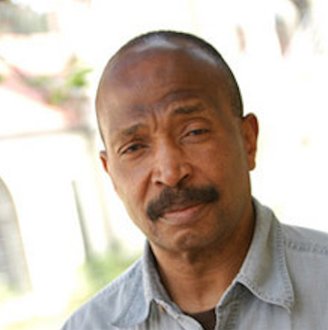A U.S. Army veteran who served in Korea in 1946 believes the North Coast, including the mothballed nuclear power plant in King Salmon, is a plausible if unlikely target for a “demonstration attack” with a North Korean long-range missile.

Warren Tindall served in the U.S. Army
Warren Tindall, 91 of Bayside, explained his reasoning in the wake of Pyongyang’s latest missile test last week over the Japanese island of Hokkaido and into the Pacific, with an estimated range of 2,300 miles.
North Korean despot Kim Jong-un must eventually unite the Korean Peninsula because of his country’s dire economic straits, Tindall believes. That could lead to “adventurism.”
Pyongyang’s estimated GDP is a puny $40.6 billion versus South Korea’s $1.9 trillion, according to CIA figures – a colossal and probably untenable imbalance over the longer term. Instability is inherent in that disjuncture.
The south is Asia’s fourth largest economy and the world’s 11th largest. The north’s closed and slave-based economy ranks 178.
Tindall theorizes that rather than launching a suicidal nuclear attack on San Francisco or the nerve center of Silicon Valley, Kim might elect to strike an inconsequential Humboldt target in hopes of persuading Washington to broker Korea’s reunification.
“Nobody could really identify with taking out a small town like Arcata or Eureka,” so the Pentagon might not retaliate, Tindall suggests.
He hastens to add that East Asia’s enfant terrible would only resort to this if he were driven to it by sheer economic trauma.
“Kim would have to be extremely desperate,” Tindall acknowledges.

Although historical analogies are considered as “wobbly as wheelbarrows” by professional historians, Tindall takes a lesson about North Korea from Japan’s decision to attack Pearl Harbor in December, 1941.
“What were the Japanese after? The oil in the Dutch East Indies [now Indonesia].” The U.S. Navy had to be disabled.
The Japanese Empire invaded the archipelago in early 1942, shortly after Pearl Harbor. Then as now, Japan lacked natural resources and was dependent on imported raw materials as World War II broke out. (Hitler invade Poland in September, 1939.)
Might the same kind of grim economic dependency induce a reckless North Korean assault on the Redwood Coast, Tindall wonders.
Scholars affirm that the Kim dynasty does harbor designs on a reunified peninsula.
Recalling his service Seoul in 1946 with the 13th Combat Engineers of the Army’s 7th Infantry, Tindall says South Korea’s thriving, high tech economy today stands in almost indescribable contrast to the primitive Korea of 71 years ago.
North Korea remains “primitive” to this day, despite its increasingly dangerous military advances and apparent achievement of a powerful hydrogen bomb capability.
Kim’s missile and nuclear weapons buildup strains the nation’s meager economic resources, literally to the point of starvation, according to U.S. intelligence.
For those who dismiss Kim’s missile and nuclear tests as saber-rattling and his rhetoric as the reincarnation of Tokyo Rose, historians note that the U.S. was driven out of North Korea because General MacArthur mistakenly assumed that the Chinese military would never invade the peninsula to save Pyongyang.
It did.
What are the odds of a nuclear attack on Humboldt?
Dissecting North Korea’s fast-developing missile and nuclear threats, a Humboldt State University world affairs expert urges North Coast residents to make their concerns known to members of Congress.

Dr. Albert Harris
Dr. Albert Harris, Professor Emeritus with HSU’s Department of Politics and a nuclear weapons and disarmament specialist, says North Korea’s accelerating development of intercontinental ballistic missiles (ICBM’s) and its multiplying nuclear bomb tests are strong incentives for coast citizens “to keep up with events.” “We should be petitioning members of Congress to lobby the Trump administration for an East Asian diplomatic settlement,” Harris says. “We should give an absolute assurance to [North Korean dictator] Kim [Jong-un] that his regime will remain intact, unharmed, if he negotiates in good faith.”
That is a very big if, the foreign policy scholar readily agrees, but the alternative, war, could kill millions.
The Redwood Coast is vulnerable because North Korea’s relatively primitive and still-developing ICBM’s could miss their notional targets by hundreds of miles.
In ballistic flight, a projectile travels briefly outside the atmosphere. Missing the intended target is known as Circular Error Probable. It’s a measure of a weapon’s precision or the lack of it.
“Kim doesn’t have to show pinpoint accuracy,” Harris admonished in a lengthy interview last week. “All he has to do is show the United States that he can drop a weapon within a 200-mile radius after a 5,000 mile ICBM flight. If he shows such a capability, California and the whole West Coast are wide open to it.”
If an errant missile missed San Francisco or Seattle, it could wind up in Humboldt. The global world would become local in the 31 minutes it would take an ICBM to fly from North Korea here.
California may want to follow suit with Hawaii and Japan.
Hawaiian officials announced on July 21 that they were re-establishing their network of Cold War sirens to warn the public of an approaching nuclear attack. Hawaii was reacting to North Korea’s launch of its first ICBM with a flight path within reach of the U.S. mainland.
Last week’s second missile test over Japan, one of Washington’s closest allies, spurred Tokyo to sound air raid sirens, transmit text message warnings and direct citizens to shelters.
Of the evermore hostile threats and counter-threats coming from Pyongyang and Washington, HSU’s Harris cautions, “I can almost assure you that at some point, maybe in the not-too-distant future, Kim wants to be able to say, ‘We just launched an ICBM—without a warhead of course—that landed a hundred or two hundred miles off the coast of Vancouver or San Francisco. That in itself would be extremely risky on his part, inviting the U.S. to act preemptively, especially with the guy we have in the White House now.”
Shortly after the July ICBM test, Kim threatened to launch multiple missiles in the vicinity of Guam, provoking the choleric and mercurial President Trump with eye-popping defiance.
The military logic is that Guam reportedly is garrisoned with the Pentagon’s largest ordnance stockpile, more than 100,000 bombs and missiles that presumably would be deployed in the event war broke out again on the Korean Peninsula, as it did in 1950-1953.
East Asia is on edge in a manner that the California coast perhaps should be. The Nikkei Asian Review reports Japan is readying preparations to evacuate almost 60,000 Japanese from South Korea as tensions harden.
There is a collateral danger of a trans-Pacific conflict touched off by a self-fulfilling prophecy, as there was in Europe in the run-up to the outbreak of World War I in August, 1914. Kim and Trump may be talking each other into war.
Another provocative display of North Korea ICBM prowess might be a week, a month or a year in the future, experts say. U.S. officials have concluded that Pyongyang’s military advances are currently progressing faster than expected.
How willing is Kim to risk nuclear annihilation?
“North Korea is a totalitarian society on the order that George Orwell envisioned in 1984,” answers Harris. He notes that the regime willingly acquiesced in the deaths of as many as 3.5 million citizens in the Great Famine of 1994-1998. It was a national economic crisis that Kim’s father romanticized as the Arduous March, konanŭi haenggun, like Mao’s 4,000 mile Long March of 1934.
In other words, the mass destruction of human life is no obstacle to the tyrannical regime.
Another part of Kim’s mentalité, his outlook, is absolute ruthlessness. A South Korean think tank, the Institute for National Security Strategy, reported in December that during Kim’s first five years in power, he executed 340 ranking members of the elites, including about 140 senior officers of the nation’s government, military and ruling Korean Worker’s Party.
Illustrative, Kim reportedly ordered Defense Minister Hyon Yong Choi to be murdered in front of an audience with an anti-aircraft gun at a military school in Pyongyang in mid-2015.
“His whole object is to instill fear, pure unadulterated fear—and to demand slavish adulation,” Professor Harris said.
Reciprocally, South Korean Defense Minister Song Young-moo has announced that Seoul will set up a special forces “decapitation” brigade by year’s end, as a tactic to keep the North Korean leader and his minions on edge.
If President Trump is restrained to some extent by Defense Secretary James Mattis or White House Chief of Staff John Kelly (both retired Marine Corps generals), the same cannot be said for Kim’s generals, Harris added. “The Kim regime is a personality cult. If his generals tell him it looks like we’ve pushed things too far and the U.S. and its allies have had enough and intend to remove us from power, he is likely to say, ‘Off with their heads!’”
The common refrain that Kim is a madman is not universal. “Kim is brutally rational,” MIT nuclear strategy expert Vipin Narang wrote in a recent Washington Post analysis.
“And that is precisely why he may have to use nuclear weapons, but not in a first strike against American cities. Kim’s nuclear arsenal exists to stop his enemies’ quest for regime change. If North Korea and the United States wind up shooting at each other, it might make sense for Kim to use nuclear weapons first in a way that increases his chances of survival,” Narang reasons.
“The basic idea is to use one set of nuclear devices to stave off the conventional invasion, and hold in reserve longer range, more powerful devices that threaten the enemy’s cities to deter nuclear annihilation.”
It’s a doctrine called asymmetric escalation, “employed by states that are conventionally weak. France articulated it during the Cold War to deter the more powerful Soviet Union, and Pakistan does the same today against a more powerful India.”
Doctrine in general sustains Kim’s bellicose nature. He adheres to a credo named “Songun,” or Military First policy. The People’s Army gets first dibs on national resources.
Professor Harris underscores that military tensions are indissolubly linked with two related perils: the near total lack of knowledge and intelligence about North Korea and the continuing Kim/Trump war of words.
He agrees with the many experts who call North Korea “a black hole” with respect to verifiable facts about the government, its politics, society, economy and people. Illustrative is the lack of consensus about the power of its sixth nuclear test on Sept. 3, believed to have been the largest to date, possibly seven times the size of Hiroshima (approx. 15 kilotons) and Nagasaki (about 20 kilotons).
Estimates of the explosive yield of the two-stage hydrogen warhead for the Hwasong-14 ICBM span a big range: 60, 100, 250 kilotons, the latter posted last week by the U.S.-Korea Institute at the Johns Hopkins School of Advanced International Studies,
The black hole vastly complicates chances of reaching a diplomatic demarche and heightens the chances of miscalculation on all sides.
Harris compares the political puzzle to the quip of Sir Mark Allen, the long-time British Foreign Service intelligence officer, who said, “Understanding Middle Eastern politics is like playing three dimensional chess underwater, with all the pieces moving simultaneously.”
The perilous psychological dynamic in the Kim/Trump bollocking war of words could likewise cripple an ad referendum accord or even aides mémoire, written summaries of key points left with the other party in diplomatic talks. Few believe a negotiated settlement is in the offing, with the two nuclear-armed leaders promiscuously throwing brickbats at each other in a sullen atmosphere of moral obliquity.
“Kim may think his threats to destroy the U.S. are a deterrent, but they can just as easily be a provocation,” Harris points out. “Same with Trump. If this becomes a mano a mano standoff, duck!”
The risks inherent in verbal salvos have a long pedigree.
“I hold it to be a proof of great prudence for men to abstain from threats and insulting words toward anyone,” high or low, wrote Machiavelli.
Threats don’t diminish the strength of your enemy and insults heighten his hatred of you and his desire for revenge.
###
Paul Mann writes for the Mad River Union. Subscribe here.
CLICK TO MANAGE